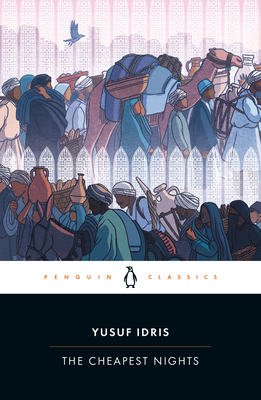The Cheapest Nights: A Collection of Short Stories by Yusuf Idris, Translated by Wadida Wassef

Publisher: Penguin Classics
Genre: Short stories, satire
Pages: 181
Format: Paperback
Buy Local (Preorder)
My Rating: 4/5 stars
Published in Egypt in 1954, this collection of short stories captures glimpses of the lives of the Egyptian lower class, most of them based in Cairo. This compilation, which is to be published on June 9, includes a few stories from Idris’s other collections as well. Here, I’ve shared my thoughts on the three stories I found the most remarkable.
Summaries
The Dregs of the City —It all begins when Judge Abdallah loses his wristwatch. Being a textbook introvert and a man of routine, this minor inconvenience sends him into an introspective spiral where he contemplates his social awkwardness and general lack of success with women. But, he must find a wife before he is thirty-five (few aspects of his life are left unscheduled), so he doesn’t give up.
The narrative describes Abdallah’s misadventures with women in a jesting, almost O Henry-esque tone until it takes a sudden turn and we meet the dark side of the man that polite society knows as Judge Abdallah—a morally bankrupt person with no shortage of enthusiasm in judging others for faults in character, especially women. The story depicts in unapologetic detail the carnal urge to abuse one’s power that lurks in the best of us, and the pain of living with oneself after it’s been done.
Did You Have to Turn on the Light, Li-Li? —A priest forgets to end the morning prayer and leaves rows of men bowed in prostration for a long time. This is eventually written off as a joke and added to the annals of the neighborhood. But the narrative reveals the real reason behind the Imam’s lapse.
It goes back to when a young Sheikh Abdel Al is appointed as the Imam of the mosque in Al Batiniyya, where the people are generally intoxicated on opium and hashish throughout the day and go to bed at dawn, when he calls for prayer. But his real test appears in the form of temptation: a woman. When we covet something that we have no right to, we tend to blame ourselves less than we blame the thing itself. The story stealthily underlines that.
Having remained chaste and above impulses all his life, he sees her as the devil incarnate, even as he is drawn to her. Suddenly, he is very aware of his mortal flesh with all its weaknesses. He prays for divine intervention so that he may remain worthy of his position. His deliverance comes in a wave of poetic irony.
The Errand —In his youth, El Shabrawi traversed the length and breadth of Cairo as a city cop. But in recent years, he has been stationed out of town and he would give his life—his words—to go back to the city, if only for an hour. As luck would have it, a woman of unstable mental disposition is brought into the police station one day by her relatives and the need arises for a chaperone to take her to the asylum in Cairo. Predictably, El Shabrawi volunteers and, as no one else does, is given the responsibility of Zebeida.
But, it turns out that it is a little difficult to enjoy all the city has to offer with a woman in tow who is screaming and struggling to get away at every step. El Shabrawi is pushed to his limits as his patience is tested and as he dashes from one government building to another, caught in a web of bureaucracy. His release comes in an unexpected way. When it does, he is taken aback by his own feelings and subsequent actions. It is a story of human compassion written at a time when the subject of mental illness was treated with little sensitivity.
Thoughts
A writer who lived in a time and society of strict moral codes, Idris’s writing is bold yet eloquent. He doesn’t hold back in his dressing-down of the entitled, privileged man, or the underprivileged man, for that matter, and shines a clear light on the oppression of the women they lord over. His stories signify that he acknowledged and despised the hypocrisy of a society that held different standards, always, for men and women, for the powerful and the subjugated.
Thank you to Changing Hands Bookstore for providing an ARC
in exchange for this honest and unbiased review.
